Catholic Virtues
 |
 |
 |
 |
 |
 |
 |
True & False Paths to Happiness - XXIII
Awakening the ‘Roar’ of the Absolutes in Man
Absolutes? If God is the Absolute, is it not inappropriate to use the plural when speaking of absolutes? If God is one, the Absolute is also one.
Here it is used as an analogy. The absolutes, in the conception adopted here, are, so to speak, imitations of the Absolute which is God. Relative beings make up an enormous gradation in the universe. Each higher degree on the scale of Creation, compared to the lower one, is like an imitation of the Absolute. Therefore, to arrive at the Absolute (with a capital letter) that is God, one can separate in each degree what it has of the relative and what it has that imitates the absolute (with a lower case).
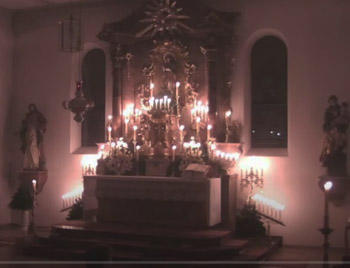 Let us return to the example of fire. Fire is obviously something relative, not the Absolute. Heat is another relative. But heat is produced by fire. For this reason, once the relationship between fire and heat is established, fire – which is a relative – is, as it were, an absolute in relation to heat.
Let us return to the example of fire. Fire is obviously something relative, not the Absolute. Heat is another relative. But heat is produced by fire. For this reason, once the relationship between fire and heat is established, fire – which is a relative – is, as it were, an absolute in relation to heat.
There is a saying that not everything that looks alike is identical, which is true. But what it looks like resembles the thing to which it appears similar. Therefore, the relative resembles the absolute.
This similarity is the solution to the problem that is the object of this study: How to contemplate the universe? For just as, by considering the painted flame, we can glimpse what a real flame is, by contemplating the creatures one can arrive at the idea of the Creator.
If this is so, the object of this search for the absolute is unlimited: It goes from the highest – the most sublime level of an eminently hierarchical universe – to the grain of dust, passing through nature, art, colors, sounds, people, society. It applies to the religious and the profane; to the great and the small.
What is at the depths of a well-formed person's head is that, through everything he knows, he must reach the absolute. It is like a certain liquor whose best part is at the bottom of the bottle: You will not drink the best if you only taste the surface. The same is true of the whole reality around us.
The absolute is the end point of everything that has quality. It is the standard through which all other things are measured.
The First Commandment & the search for the absolute
True absolutes can be found in the virtues, divinely summarized in the Ten Commandments. These do not have the same value, but are stated in order of importance. Those that concern God (the first Three) are immeasurably more important than those that concern man. Further, the first Three Commandments of the Decalogue condition the practice of the others – especially the First, which is the king of all the other Commandments.
Whoever truly loves God keeps the other Commandments. Perfection, integrity, duration, solidity in the practice of the other Commandments depend on the First Commandment: the love of God.
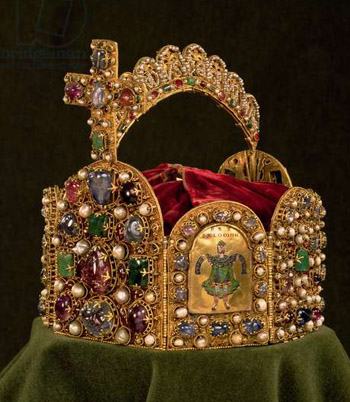
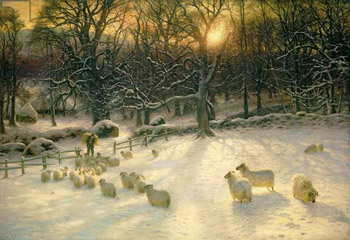 On the other hand, current teaching regarding the First Commandment, which was correct in the pre-Conciliar Church, in the circumstances of our time requires that we insist on some particular points. It is especially necessary to insist on the search for the absolute. This search is part of what could be called a school of the love of God.
On the other hand, current teaching regarding the First Commandment, which was correct in the pre-Conciliar Church, in the circumstances of our time requires that we insist on some particular points. It is especially necessary to insist on the search for the absolute. This search is part of what could be called a school of the love of God.
It is not just the love of God as you learn in catechism class – the love for the invisible God, which is certainly the main thing – but it is also indispensable to have love for the visible things that are in accordance with God. Likewise we should hate those things that follow the way of error, sin and evil.
Knowing that a pearl is obviously not God, we can, however, know what He is like by imagining the qualities of the One who created the pearl, in the same way that through a work of art one can conjecture what the artist's soul is like.
Only God – the transcendent God, the personal God, the God of Catholic theology, of the Popes, of the theologians, of St. Thomas Aquinas – is Absolute. All other beings are relative and contingent. But a being on the upper step that imitates the absolute, in comparison with one on the lower step, is closer to the absolute.
Thus, sacral contemplation invites us to see, behind the most varied beings, the Absolute that the person or thing imitates. And, in that way, it allows us to reach God.
Egalitarianism rejects the absolute
The proper use of symbolism leads us to the absolute. When we know the absolute, we know something we love, which transcends us infinitely and completely, before which we take an attitude of vassalage.
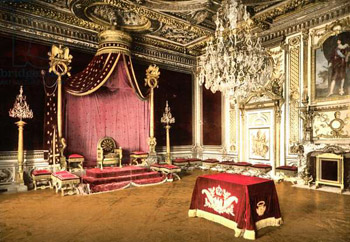 The spirit that loves the absolute is prone to love all the things that are in order of vassalage. On the contrary, the spirit that does not like the absolute, hates vassalage.
For this reason, egalitarianism rejects symbolism and, above all, the absolute. Whoever has a hierarchical spirit is open to symbolism and the absolute.
The spirit that loves the absolute is prone to love all the things that are in order of vassalage. On the contrary, the spirit that does not like the absolute, hates vassalage.
For this reason, egalitarianism rejects symbolism and, above all, the absolute. Whoever has a hierarchical spirit is open to symbolism and the absolute.
In all things where there are several symbols represented, several analogies are possible. That which has a greater fullness of representation of the Absolute is like the king of that similarity compared to the others. It is a kind of quintessence of everything else.
For example, it could be said that in a throne room there are several elements that symbolize royalty. The throne, however, is the one that most resembles it, being, therefore, the "king" of the room.
Awakening the 'roar of the absolute'
The study of the absolute, symbolism, the role of art and culture may suggest that the system of thinking described here does not aim to generate certainties, but only sensations. Nothing could be more false! Both in our life of thought, and in that of action, the quest for the Absolute strongly helps us to realize ourselves and to develop those solid certainties that are born from the junction of knowledge and love of God.
In today's broken man, it is necessary to awaken, through figures, speeches, comments and explanations, the love for the Absolute.
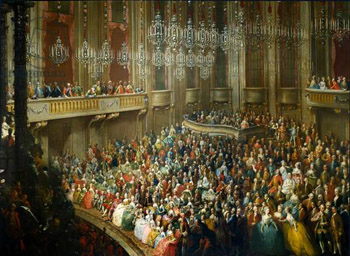 To be continued
To be continued

Here it is used as an analogy. The absolutes, in the conception adopted here, are, so to speak, imitations of the Absolute which is God. Relative beings make up an enormous gradation in the universe. Each higher degree on the scale of Creation, compared to the lower one, is like an imitation of the Absolute. Therefore, to arrive at the Absolute (with a capital letter) that is God, one can separate in each degree what it has of the relative and what it has that imitates the absolute (with a lower case).

The candle fire leads one to consider the absolute Light of the World
There is a saying that not everything that looks alike is identical, which is true. But what it looks like resembles the thing to which it appears similar. Therefore, the relative resembles the absolute.
This similarity is the solution to the problem that is the object of this study: How to contemplate the universe? For just as, by considering the painted flame, we can glimpse what a real flame is, by contemplating the creatures one can arrive at the idea of the Creator.
If this is so, the object of this search for the absolute is unlimited: It goes from the highest – the most sublime level of an eminently hierarchical universe – to the grain of dust, passing through nature, art, colors, sounds, people, society. It applies to the religious and the profane; to the great and the small.
What is at the depths of a well-formed person's head is that, through everything he knows, he must reach the absolute. It is like a certain liquor whose best part is at the bottom of the bottle: You will not drink the best if you only taste the surface. The same is true of the whole reality around us.
The absolute is the end point of everything that has quality. It is the standard through which all other things are measured.
The First Commandment & the search for the absolute
True absolutes can be found in the virtues, divinely summarized in the Ten Commandments. These do not have the same value, but are stated in order of importance. Those that concern God (the first Three) are immeasurably more important than those that concern man. Further, the first Three Commandments of the Decalogue condition the practice of the others – especially the First, which is the king of all the other Commandments.
Whoever truly loves God keeps the other Commandments. Perfection, integrity, duration, solidity in the practice of the other Commandments depend on the First Commandment: the love of God.

Seeking the absolute in the jewels of Imperial Crown or in the purity of the glistening snow as the sun sets

It is not just the love of God as you learn in catechism class – the love for the invisible God, which is certainly the main thing – but it is also indispensable to have love for the visible things that are in accordance with God. Likewise we should hate those things that follow the way of error, sin and evil.
Knowing that a pearl is obviously not God, we can, however, know what He is like by imagining the qualities of the One who created the pearl, in the same way that through a work of art one can conjecture what the artist's soul is like.
Only God – the transcendent God, the personal God, the God of Catholic theology, of the Popes, of the theologians, of St. Thomas Aquinas – is Absolute. All other beings are relative and contingent. But a being on the upper step that imitates the absolute, in comparison with one on the lower step, is closer to the absolute.
Thus, sacral contemplation invites us to see, behind the most varied beings, the Absolute that the person or thing imitates. And, in that way, it allows us to reach God.
Egalitarianism rejects the absolute
The proper use of symbolism leads us to the absolute. When we know the absolute, we know something we love, which transcends us infinitely and completely, before which we take an attitude of vassalage.

The throne room at Fontainebleau Palace
In all things where there are several symbols represented, several analogies are possible. That which has a greater fullness of representation of the Absolute is like the king of that similarity compared to the others. It is a kind of quintessence of everything else.
For example, it could be said that in a throne room there are several elements that symbolize royalty. The throne, however, is the one that most resembles it, being, therefore, the "king" of the room.
Awakening the 'roar of the absolute'
The study of the absolute, symbolism, the role of art and culture may suggest that the system of thinking described here does not aim to generate certainties, but only sensations. Nothing could be more false! Both in our life of thought, and in that of action, the quest for the Absolute strongly helps us to realize ourselves and to develop those solid certainties that are born from the junction of knowledge and love of God.
In today's broken man, it is necessary to awaken, through figures, speeches, comments and explanations, the love for the Absolute.

The splendor or court at the concert in 1760 for the
wedding of Emperor Joseph II and Isabella of Parma

Posted January 4, 2021





